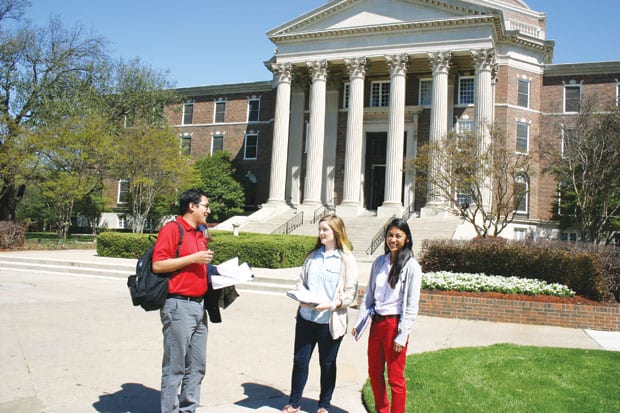Two-third of students voting must support the special-interest seat, and Spectrum students believe they’ll prevail in a second election

REVOTE | Harvey Luna, Shelbi Smith and Kathrina Macalanda, outside Dallas Hall on the SMU campus, collected signatures this week for their petition to add an LGBT Student Senate seat. (David Taffet/Dallas Voice)
Southern Methodist University students are collecting signatures, hoping to get a revote on adding an LGBT Student Senate seat after the measure failed on April 3.
The Student Senate had voted a week earlier, 34-3, to add a special interest seat for LGBT students. The issue has come up every year since 2009 when then-student Tom Elliott proposed the addition. This is the first year the proposal passed.
To comply with the student constitution, the student body must pass a Senate-approved resolution by a two-thirds vote to amend the constitution. Only 53 percent of students participating in the election to add an LGBT seat voted for it.
David Chard, dean of the school of education, called the vote disappointing. He said he thought most faculty members and the administration supported the idea of adding the seat, but creating the seat was a process the undergraduate student body needed to work through without interference.
“It’s an undergraduate issue,” Chard said. “They need to work on it themselves.”
Shelbi Smith, co-president of Spectrum, SMU’s undergraduate LGBT group, said she and others were scrambling to get 1,053 student signatures, or 10 percent of undergraduates, on a petition by Monday to get a revote. She said she thought a number of things contributed to the measure failing.
The student body voted just days after the Senate passed the resolution, which gave Spectrum and its allies little time to get word out to vote.
Also, the issue was at the end of a ballot to elect student government representatives, so many who did vote didn’t care about the issue and just voted against it.
Then there was the issue of special interest seats. Others include an African American, Hispanic, Asian and foreign student positions. Smith said some students oppose all special interest seats. Others, for religious or other reasons, oppose just the LGBT seat.
While Smith was at an SMU diversity fair to collect more signatures, she was disappointed to find that some students who were taking part in the event are opposed to adding an LGBT seat in the Senate.
Harvey Luna, a former Spectrum president now runs YWCA, an on-campus group that focuses on social justice issues.
“I feel a little down,” he said, referring to the April 3 vote, “but this has us fired up to do more and get more people involved.”
He said about 15 people are collecting signatures, but he would like an additional 10 working around campus. If each gathered 50 signatures, he said, they’ll have the number needed by the Monday deadline.
Another student, Kathrina Macalanda, who served on the Student Senate last year, also was disappointed the measure didn’t pass.
“I’m shocked by the difference in how the Senate voted and how the student body voted,” Macalanda said.
She pointed out that the vote shows the difference between student leadership and the student body. As Smith works to eliminate that disparity she said she believes increased LGBT visibility on campus would help. That way, she said, people would say, “Oh, I do know gay people. They’re not that different.”
She said if more people would come out and be visible on campus, that would encourage even more people to come out.
Spectrum and its allies have until noon on April 21 to turn in the signatures to the Senate. The signatures will be verified, and they’ll know by that evening if a revote will occur. If it does, it will take place Wednesday and Thursday, and the proposal will appear on a ballot by itself. That doesn’t give Smith and other supporters much time to get the word out, but she said people interested in this particular issue will be the only ones who will vote. She thought that would favor passage.
Former SMU student Elliott, who now lives in Chicago, said there’s a lack of understanding why the Sentate LGBT seat is important.
“LGBT students are still facing discrimination,” he said.
He cited an incident he heard of this semester where anti-gay slurs were shouted out of windows at a gay student.
Other gay students, however, don’t report negative experiences.
Oscar Cetina said he has no problem being out at SMU and is most comfortable in his Latino fraternity where he serves as president.
“I can be myself — out in my sexuality and out in my ethnicity,” he said. “I don’t have to choose.”
He said he’s getting signatures on the petition from his entire fraternity.
This article appeared in the Dallas Voice print edition April 11, 2014.

